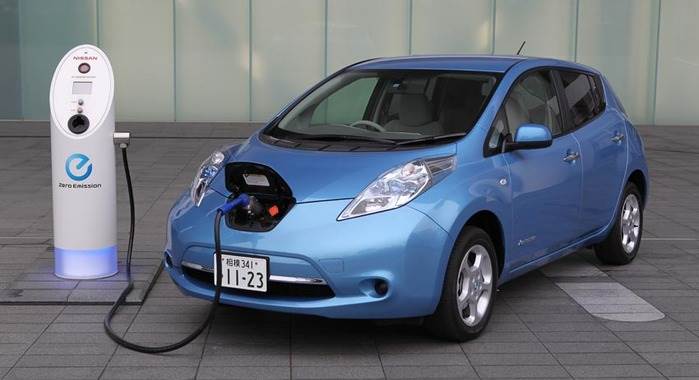Nissan has started testing a system to use its electric vehicle technology to power its dealerships, and thereby save electricity for a rainy day. This will help power grids cope with peaks in demand and ensure continuity of supply during natural disasters. It could also make electricity from renewable sources, like the wind or sun, more viable by storing power that can be used when there's high demand.
Nissan is using Nissan Leaf electric vehicles (EV) and the ‘Leaf to Home’ power supply system in the field tests. Conducted by ENERES Co., Nissan is using the two - Nissan Leaf EVs paired with the Leaf to Home power supply system - to test 'demand response' at several of its dealerships. These tests will essentially evaluate the effectiveness of EV batteries when used for energy management.
Demand response is a strategy to make power grids more efficient by modifying consumers' power consumption after considering the available energy supply.
Under the demand response scheme, power companies request aggregators to use energy conservation measures, and they are compensated for the electricity that they save. Usually, when energy-saving is requested consumers may respond by moderating their use of air conditioning and lighting. However, by using the storage capacity of electric vehicles and Vehicle to Home (V2H) systems, consumers can reduce their use of power at peak times without turning off lights and appliances. This is particularly useful in commercial establishments where it is difficult to turn power off to save electricity.
The demand response scheme involves assessing the usefulness of energy-saving measures using V2H systems during peak-use periods and analyzing the impact of monetary incentives on business.
For example, the testing involves a Leaf and Leaf to Home system which is connected to power a Nissan dealer's lighting system during regular business hours using stored battery energy. This reduces electricity demand on the power grid. The aggregator is then compensated for the equivalent of the total amount of electricity that is saved. Two or three tests per month will be conducted on designated days for three hours' each time.
Effective use of renewable energy and improvements in the efficiency of power generation facilities will enable better energy management in the future, and help reduce environmental impact. Field tests using EVs' high-capacity batteries that are being conducted globally are proving their effectiveness in energy management.
Additionally, if similar compensation schemes for energy-saving activities were applied to EV owners it could accelerate the wider adoption of EVs and reduce society's carbon footprint. Nissan has sold more than 142,000 Leafs globally since launch. The company says the Leaf’s power storage capability in its onboard batteries, coupled with the Leaf to Home power supply system, is proving attractive to many customers. Nissan is promoting the adoption of EVs to help build a zero-emission society in the future. Along with these energy management field tests, the carmaker is actively creating new value through the use of EVs’ battery power storage capability and continuing to promote initiatives that will help realize a sustainable low-carbon society.



Comments
Member Login
Personal Details
No comments yet. Be the first to comment.